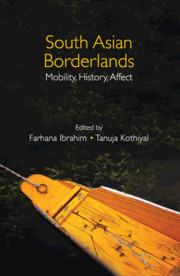Book contents
- Frontmatter
- Contents
- List of Figures and Tables
- Acknowledgements
- Introduction
- 1 Paradise at the Frontier: Kashmir as a Political Terrain and Literary Landscape in the Mughal Empire
- 2 Borders in the Age of Empire and Nation-States: The Honeycomb of Borderlands: Kumaun, Western Tibet and Far Western Nepal
- 3 Borders, Difference, Recognition: On the Cause(s) of Gorkhaland
- 4 Embattled Frontiers and Emerging Spaces: Transformation of the Tawang Border
- 5 Relative Intimacies: Belonging and Difference in Transnational Families across the Bengal Borderland
- 6 Reading Parijat in Nepal: The Poetics of Radical Feminism Negotiating Self and Nation
- 7 Commodity Journeys and Market Circuits: Making Borders ‘Natural’ in Colonial Western Himalayas
- 8 Frontiers, State and Banditry in the Thar Desert in the Nineteenth Century
- 9 Bureaucracy and Border Control: Ethnographic Perspectives on Crime, Police Reform and ‘National Security’ in Kutch, 1948–52
- 10 Frontier as Resource: Law, Crime and Sovereignty on the Margins of Empire
- About the Contributors
- Index
5 - Relative Intimacies: Belonging and Difference in Transnational Families across the Bengal Borderland
Published online by Cambridge University Press: 17 September 2021
- Frontmatter
- Contents
- List of Figures and Tables
- Acknowledgements
- Introduction
- 1 Paradise at the Frontier: Kashmir as a Political Terrain and Literary Landscape in the Mughal Empire
- 2 Borders in the Age of Empire and Nation-States: The Honeycomb of Borderlands: Kumaun, Western Tibet and Far Western Nepal
- 3 Borders, Difference, Recognition: On the Cause(s) of Gorkhaland
- 4 Embattled Frontiers and Emerging Spaces: Transformation of the Tawang Border
- 5 Relative Intimacies: Belonging and Difference in Transnational Families across the Bengal Borderland
- 6 Reading Parijat in Nepal: The Poetics of Radical Feminism Negotiating Self and Nation
- 7 Commodity Journeys and Market Circuits: Making Borders ‘Natural’ in Colonial Western Himalayas
- 8 Frontiers, State and Banditry in the Thar Desert in the Nineteenth Century
- 9 Bureaucracy and Border Control: Ethnographic Perspectives on Crime, Police Reform and ‘National Security’ in Kutch, 1948–52
- 10 Frontier as Resource: Law, Crime and Sovereignty on the Margins of Empire
- About the Contributors
- Index
Summary
‘I married into India out of greed for the melas (fairs) and now I am stuck … no jawa-asha [coming and going] for me,’ declared Shefali Barman, with a deep sigh. A 26-year-old widow in Putimari, a border village in the Coochbehar district, eastern India, she was bemoaning her inability to cross the border to attend a nephew's rice-eating ceremony, where all her natal family would be gathered, in the nearby Bangladeshi border village of Boraibari. The circuitous route Shefali usually took between Putimari (India—hereafter, Ind) and Boraibari (Bangladesh—hereafter, BD), across an unfenced portion of the border, had become closed at the time due to a newly stationed Indian Border Security Force (BSF) patrol there. She hastened to explain her reason for entering into a marriage across an international border, lest it be thought flippant.
In my childhood, our father or older brothers would take my sisters and me to the Rash Mela in Coochbehar and smaller melas during Durga Puja and Rathjatra in Dinhata. You see, it was no fun being Hindu in Bangladesh—but each time we would come here [West Bengal, India], we would see that so many women, so many families, Hindu and Muslim, who would come to these melas, travelling to them from different places and enjoying them till late at night.… The border was open in those years [late 1980s to early 1990s], and the distance between Boraibari and Dinhata was not very much. Jawa-asha was very easy, and when it was necessary we occasionally stayed a night or two at relatives’ homes. Then we would return to Bangladesh with toys, new dresses, and sweets.
With two paternal aunts married in the same area of the Coochbehar district, Shefali had also grown up as a witness to the ease of their jawa-asha across this international border. Having thus travelled these cross-border routes herself, she had been agreeable to the proposal of marriage when it was broached, with the reassurance that it was close enough within the borderland for her to visit frequently. Shefali's deep disappointment with her present immobility is thus made sharper in contrast to the memories of these cross-border journeys of her childhood and expectations based on those experiences.
- Type
- Chapter
- Information
- South Asian BorderlandsMobility, History, Affect, pp. 123 - 145Publisher: Cambridge University PressPrint publication year: 2021



